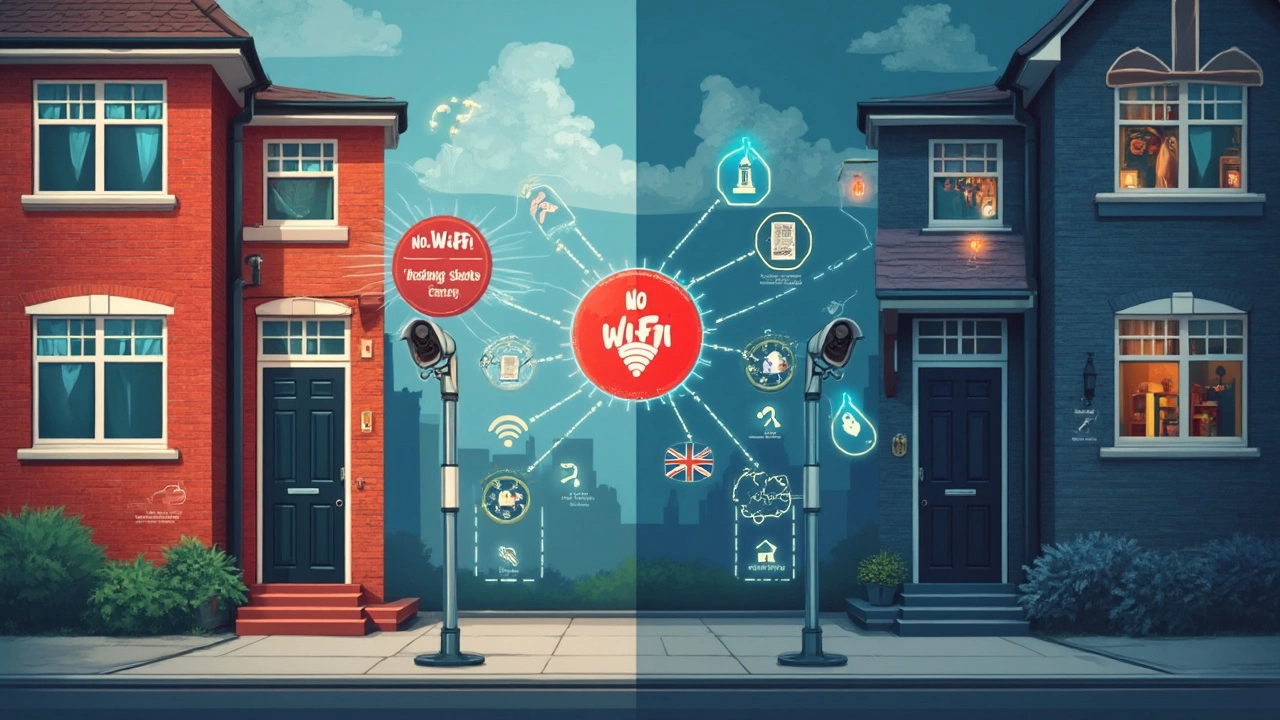Picture this: a storm knocks out your Wi-Fi in the middle of the night. You know your phone and tablet are dead in the water, but what about your house alarm? Can burglars just stroll in? It’s something a lot of people never think about—until it’s too late.
Here’s the scoop: your alarm system might not need Wi-Fi at all. In fact, a lot of basic alarms just use old-school phone lines or run totally offline. But things get interesting (and maybe a little tricky) if your system relies on a mobile app, sends alerts to your phone, or needs the internet to call for help. Suddenly, that Wi-Fi connection actually matters.
Don’t panic—most quality alarms have backup plans. Some switch to cellular signals if Wi-Fi dies, others sound local sirens no matter what. But it all depends on what you bought, how it’s set up, and if you’ve got backups in place.
- What Happens to Alarms Without Wi-Fi?
- Types of Alarm Systems: Wired, Wireless, and Smart
- Real-Life Examples: When Connectivity Fails
- Practical Tips for Reliable Home Security
What Happens to Alarms Without Wi-Fi?
Think Wi-Fi is your alarm’s lifeline? Not always. Most house alarms—especially the older or wired types—work just fine without any internet. They rely on direct connections, local sirens, or plain old phone lines. So, even if your Wi-Fi fizzles out, your basic alarm probably keeps doing its main job: making lots of noise if someone breaks in.
Here’s where it gets interesting: smart alarms and app-connected systems handle this totally differently. If your system sends alerts to your phone or lets you control things remotely, no Wi-Fi can be a big deal. Without internet, these features stop working. But the alarm itself might still trigger a siren inside your house.
To see how alarms react to Wi-Fi blackouts, check out the quick reference below:
| Alarm Type | Works Without Wi-Fi? | What Stops Working? |
|---|---|---|
| Traditional Wired | Yes | Nothing; fully local |
| Wireless (Radio Frequency) | Yes | Remote notifications |
| Smart Wi-Fi Only | No (limited function) | App controls, mobile alerts |
| Smart with Cellular Backup | Yes | Nothing, unless cell service is down too |
Here’s the bottom line: if you’ve got a house alarm that uses only Wi-Fi, and your internet fails, you’ll lose remote features and maybe alerts to your phone. But most alarms will still blare if triggered. For extra peace of mind, systems with cellular backup keep things running even if both power and Wi-Fi crash.
Types of Alarm Systems: Wired, Wireless, and Smart
If you've ever shopped for a house alarm, you know there are three main types: wired, wireless, and smart. Each one handles Wi-Fi outages differently, so it’s worth knowing which type is watching your place.
Wired alarm systems are old school, but super reliable. These use hardwired connections—think physical cables running through walls—so they keep working if the internet drops. Most of them connect to a basic phone line for monitoring, so unless your landline is down too, you're still covered. They don’t rely on batteries like wireless models, and power outages are only a problem if you have no backup battery.
Wireless alarm systems are popular because there’s no need to drill holes or snake wires, and installation usually takes less than an hour. They use radio signals to talk between sensors and the main control box. Here’s where folks get confused: these alarms don’t need your Wi-Fi for basic protection. But, if they need to alert you with a phone notification or let a monitoring team know about a break-in, then either Wi-Fi or a built-in cellular backup does the heavy lifting.
Smart alarm systems usually connect everything—sensors, cameras, mobile apps—over your home’s internet. That means if your Wi-Fi is out, some things (like live video feeds or instant app alerts) stop dead. The best smart alarms have backup cellular modules so you’re not totally exposed when the signal drops. But not all do, and some cheap sets leave you in the dark without Wi-Fi. Always double-check the specs.
- Wired systems: physical cables; don’t need Wi-Fi; often just a landline connection
- Wireless systems: communicate via radio; only need Wi-Fi for alerts or remote controls
- Smart systems: use Wi-Fi for cloud services; top brands offer cellular backup, but not always
Here’s a quick comparison so you can see how each type works if Wi-Fi goes down:
| System Type | Needs Wi-Fi to Sound Alarm? | Sends Alerts Without Wi-Fi? | Backup Options |
|---|---|---|---|
| Wired | No | Yes (via landline) | Battery for power loss |
| Wireless | No | Sometimes (has cellular backup?) | Cellular backup, batteries |
| Smart | No | Maybe (depends on brand and backup) | Cellular backup for top models |
If you're weighing your options, just remember the key question: if my internet cuts out, will my alarm still protect me—and how will I even know?

Real-Life Examples: When Connectivity Fails
Let's get real—everyone loves their smart gadgets until the Wi-Fi cuts out. Here’s what actually happens with common house alarms during an outage, and it’s way less “Hollywood” than you’d think.
Back in Texas in February 2021, the winter storm knocked out both power and internet for millions. Families with “smart” alarms that only used Wi-Fi found out the hard way: no notifications, no app controls. The system itself often kept blaring its siren locally, but nobody offsite got a ping.
Meanwhile, neighbors with traditional, landline-based alarms didn’t miss a beat. Their alarms dialed monitoring centers just as advertised. Why? Those systems don’t need Wi-Fi and can even work during long power cuts if there’s a backup battery.
Now, if you’re running a system that’s tied into both Wi-Fi and cellular backup—like many modern pro setups—the outcome is better. For example, SimpliSafe and ADT’s upgraded packages auto-switch to a cell signal if Wi-Fi fails. The odds of both dropping together? Pretty low, unless it’s doomsday.
| Alarm Type | Wi-Fi Dependent? | What Happens When Wi-Fi Fails? |
|---|---|---|
| Basic Wired | No | Siren still sounds, landline alerts work |
| Standard Wireless (Wi-Fi Only) | Yes | Local alarm works, but remote alerts stop |
| Wireless + Cellular Backup | No (if backup active) | System switches to cell, alerts keep working |
It’s not just storms. Power drills in your neighborhood, accidental ISP cutouts—these things take down Wi-Fi more often than you’d expect. The trick is knowing if your house alarm just makes noise or actually sends out a cry for help when there's trouble.
The takeaway? If you want true peace of mind, nail down how your alarm talks to you and the outside world before you need it. Sometimes old-school backup is the unsung hero.
Practical Tips for Reliable Home Security
If you want your house alarm to work even when Wi-Fi goes down, you need more than wishful thinking. A lot of problems crop up when internet connections fail, but you can avoid the worst of it with a couple of smart moves that don't cost much—or anything at all. Here's how to make your system tough, not just clever.
- House alarm systems with a built-in cellular backup keep working even when Wi-Fi or phone lines drop. Many big brands offer models that flip over to LTE automatically, which is a game-changer during power outages or when someone cuts your cable outside.
- Check your backup power source. Even if your alarm can talk to you without Wi-Fi, it still needs juice. Make sure your control panel and sensors are sitting on a charged battery. Swap batteries every couple of years—don’t wait for that annoying chirp.
- If your system is Wi-Fi-dependent for app alerts, pick a mobile plan with unlimited data. Some people use old smartphones as backup hotspots in a pinch. Even an inexpensive prepaid SIM can keep things running for emergencies.
- Stick a loud siren near entries. If a break-in happens and Wi-Fi or cellular both fail, a 100-decibel alarm will scare off intruders and grab your neighbors’ attention. Good alarms make a racket to buy you time, even if they can't call for help directly.
- Regularly test your system—don’t trust that "ready" light forever. Once a month, unplug your router and see if your alarm still works. Set reminders in your phone; it only takes five minutes.
- Ask your alarm company if they support dual-path monitoring (cellular and internet together). It sounds fancy but just means if one route fails, the other kicks in. Many modern systems do this by default, but always double-check.
Having an alarm is only half the battle. Making sure it works no matter what—that’s how you actually get peace of mind.

